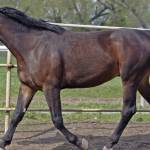Feeding After the Finish Line

Retired racehorses can present some nutritional challenges to their new owners. While no single approach will be the magic solution for every horse, some general guidelines can help your recently retired athlete flourish.
When a horse leaves the track, its caloric requirement will decrease along with its reduced workload. However, this will not occur immediately as the horse’s metabolic rate will be quite high as it is accustomed to high intensity exercise and significant caloric intake and expenditure. For this reason, immediately decreasing the horse’s caloric intake by radically reducing its grain ration may result in undesirable weight loss. Instead, a gradual reduction in grain intake (from the level fed while in race training to a level more appropriate to the horse’s new situation) over a period of several weeks may be more appropriate to both foster weight gain and allow for a slow reduction in the horse’s metabolic rate. Gradual weight gain should be the goal. Conversely, maintaining the extreme concentrate intakes common at the track could lead to trouble once the horse is in a less physically demanding role, especially if the horse is also introduced to pasture as this will likely lead to excessive weight gain and an overabundance of energy.
Because many racehorses are maintained on concentrates and hay alone, grass may be a novel element in their diet. Be sure to gradually increase the amount of time on grass the horse is allowed. Once the horse is slowly acclimated to pasture, it should form the base of its diet. If pasture is not available, high-quality hay or other forms of forage, such as cubes or chaff, can also be used.
Quality is especially important when selecting hay for a horse needing condition. Hay analysis can determine if the hay is laden with or lacking in nutrients. A mixed variety (part grass and part legume, usually alfalfa) is often a good choice, although straight alfalfa can also be appropriate if the horse needs to pack on some pounds. While you want to avoid overloading on concentrates, there’s no such thing as too much hay, at least until the horse achieves the desired weight.
Remember to keep clean water available to the horse at all times, especially one that is eating dried forage, as this helps maintain proper digestive function.
Other issues to consider when transitioning a horse to life off the track are gastric ulcers, dental care, vaccinations, and parasite management.
If you need additional assistance, talk to your veterinarian or ask an equine nutritionist.
Related reading:








